Sun 25 Jan 2015
Documentary by ex-resident of Bolinas tells story of Burundi-genocide survivor
Posted by DavidMitchell under General News
1 Comment
Most of us remember the Rwandan genocide, in which ethnic Hutus slaughtered 500,000 to a million ethnic Tutsis between April 7 and July 15, 1994. Less well known is the genocide a year earlier in the neighboring East African country of Burundi where 300,000 Tutsis perished.
A new documentary, Deo: Escape from Burundi, by former Bolinas resident Ole Schell tells what happened in Burundi and how one moneyless survivor managed to escape to the United States, learn English, graduate from the Harvard School of Medicine, and then return to his former village where he organized the creation of a health center. (Click here to watch the 20-minute video)
The filmmaker is the son of Ilka Hartmann of Bolinas, a renowned documentary photographer. As it happened, Deo Niyizonkiza, the survivor, visited Napa, and she shot some still photos of him that are included in the documentary. Ole’s father is Orville Schell, former dean of the Graduate School of Journalism at U.C. Berkeley and now director of the Center on U.S.-China Relations at the Asia Society in New York.
Ole Schell was interviewed last Thursday on Huffington Post Live about his new documentary, Deo: Escape from Burundi. (Click here to watch interview)
The massacre of Tutsis by ethnic Hutus was not the result of a centuries-old animosity, as many of us had assumed. The real culprit in the bloodshed was Belgium in the 20th century, Ole says. At the end of the 19th century, Germany colonized Burundi and Rwanda but after its defeat in World War I was forced to cede them to Belgium.
Although the Hutu and Tutsi spoke the same language, the Belgians officially separated them as part of a policy of “divide and conquer,” Ole says in his Huffington Post interview.
Belgian colonist measuring noses to decide who was a Hutu and who was a Tutsi.
“They would measure people’s noses, cheekbones, and height and declare some people Hutus and some people Tutsis,” Ole told the Huffington Post. “It was almost arbitrary. Some people in the same family would be a Tutsi and some would be a Hutu.
“It really didn’t make much sense, but it took hold and got in the psyche of the people.” The result was a series of genocides perpetuated by both sides.
The genocide in 1993 grew out of a 1972 rebellion when Hutu members of the gendarmerie (soldiers with police duties) tried to estabish a new republic, killing thousands of Tutsis, as well as any Hutus who wouldn’t join the insurrection. In response, Burundi’s president, a Tutsi, declared martial law, and 80,000 to 210,000 Hutus were slaughtered.
In 1993, Tutsi soldiers assassinated Burundi’s first democratically elected head of state, a Hutu, and civil war broke out in within a day.
Deo Niyizonkiza, the survivor and central character of the documentary, was a 20-year-old medical student in Burundi when the slaughter began. Ole’s video relates how narrowly Deo, a Tutsi, escaped machete-wielding Hutu militiamen.
Deo’s entire odyssey is inspiring. When he was young, he says, a class might start the school year with 50 or 60 students. Only half that many would start the next year, the others having died mostly from curable diseases. There was no medical care whatsoever in his rural village and none in the area.
So he decided to study medicine. He moved to a city and was at work in a hospital when word came that the president had been killed and that Hutu militias were killing every Tutsi they could find.
Members of a Hutu militia.
Militiamen could be heard entering the hospital and killing people either with machetes or by burning them alive. Deo ran to his room and hid under the bed. In his haste, however, he forgot to lock the door.
Ironically, that saved him. A militiaman opened the door, looked around the room, and remarked, “….That cockroach [insulting slang for Tutsi] is gone.” He then left.
Tutsis burned alive by Hutu militia.
When the militiamen finally left, there were piles of bodies everywhere. Because flesh had been burned, the smell of meat was in the air, Deo recalled.
He escaped into the woods and walked for days to reach Rwanda where a Hutu woman got him into the country by telling soldiers he was her son. After six months in Rwanda, Deo returned to Burundi.
A friend bought him a ticket to New York so he could get out of the country and study medicine at a good school. He arrived with only $200 and speaking no English. For awhile he lived in an abandoned tenement in Harlem and then in Central Park.
Deo is clearly a pleasant, diligent man, and working as a deliveryman he met a church worker who took a liking to him and introduced him to a couple who gave him shelter. They also taught him English, helped him get legal residency, and ultimately be admitted to Harvard and Columbia universities.
New health center.
At Harvard, Deo was impressed by Professor Paul Farmer, whose Partners in Health organization brought medical care to impoverished regions of the globe, and he began working with it. While working in Rwanda in 2005, Deo returned to Burundi to visit his ailing mother.
Appalled at the unhygienic practices he observed in a Burundi hospital, such as two patients using the same IV, he decided to build a health clinic in his home village, the documentary notes.
Within a year, Deo had a bare-bones clinic in operation, and it has now grown into a modern facility that includes a community center. Villagers have formed cooperatives to grow food. Most importantly, the introduction of modern medicine has had a dramatic effect on the health of villagers.
Before: What having medical care available has meant to a villager called Frederick.
After: And that’s just the start. You can see the heart-warming documentary online by clicking on the link at the top of this posting.

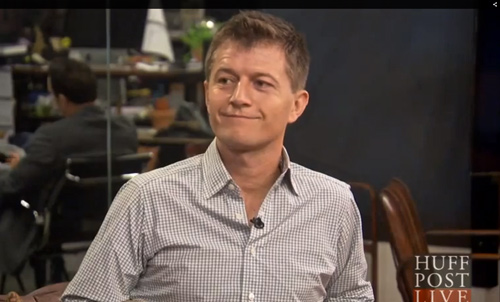



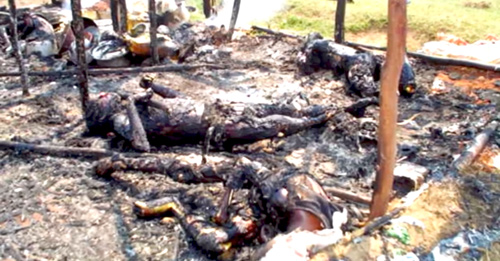
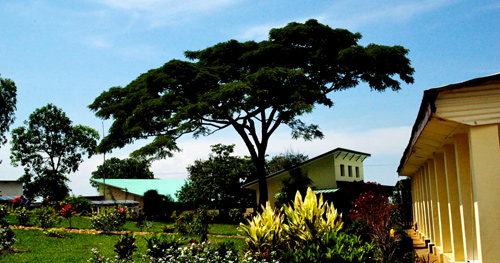
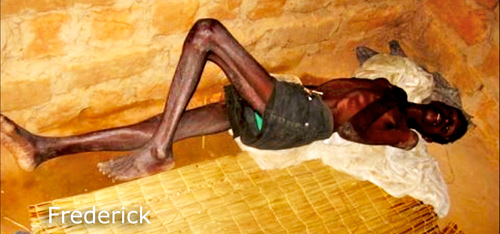
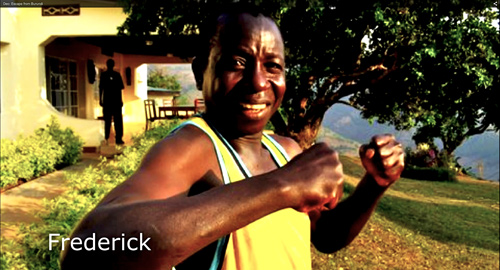
Sorry to digress from your post of this horror, Dave, but I wanted to say how delighted I was to read in Upper Iowa’s “Bridge” that you had received the ISWNE Eugene Cervi Award for your career in weekly newspapers. Congratulations! [I couldn’t find a way to write you other than in the comment section of your blog.]
I retired from college teaching in May of 2011. Denise still works half time as director of the UNO art gallery in Omaha. Otherwise our lives revolve around our children and grandchildren. Not too long ago I began posting a few of my writings and drawings at the site I mention above; and like most grandparents with family all over the place we use our Facebook page for family photos and family news.
Denise is a birder, so I know she will enjoy your album of photos of birds around your home.
I think the last time we corresponded was shortly after the 2001 terrorist attacks. I regret that our exchange did not go well. Alas, the wars go on and on.
I know nobody at Upper Iowa any longer — all dead or retired. Bill Wolff is an Episcopalian priest. His wife Lu is retired. Once every three or four years I get a brief note from Gary Jones. I think he’s still teaching at a high school in Oregon, I forget which city.
Again — congratulations on the award. Hoping you are healthy and happy —
Bob